九年级英语Unit+7+Teenagers+should+be+allowed+to+choose+their+own+clothes.全单元导学案
- 格式:doc
- 大小:261.50 KB
- 文档页数:18
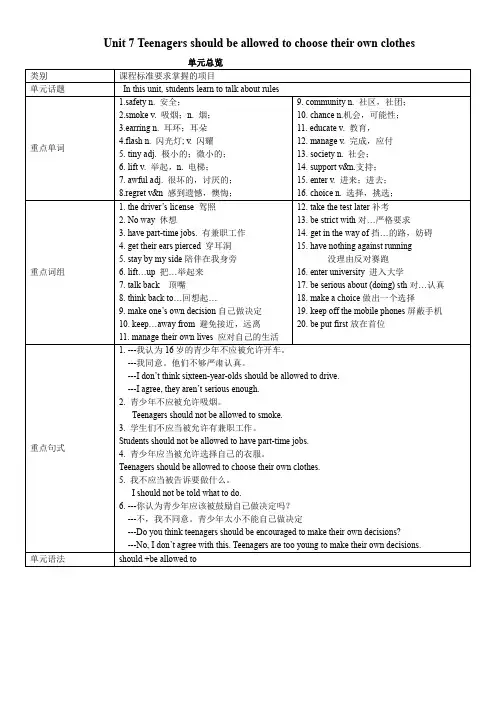
Unit 7 Teenagers should be allowed to choose their own clothes课时分解第一课时 Section A (1a ~ 2d )§自主学习方案 【自学自查】根据汉语提示完成单词。
1. The policeman asked the driver to show his driver ’s license (执照).2. My mother doesn ’t like the girl who wears the earrings (耳环).3. Most of the parents are worrying about their children ’s safety (安全)。
4. My father coughed badly, the doctor asked him to give up smoking (吸烟),5. Nowadays teenagers (青少年) have many different thoughts.§课堂导学方案 Step 1 情景导入每个青少年在生活中都会碰到允许或者不允许做某事,例如在商场购物时,我们应该允许选择自己的衣服,而作为父母却不允许我们选择自己的衣服,你们有这样的经历吗?你们是赞同还是不赞同呢,请大家说出自己的观点。
Teacher : Could you tell me what students should be allowed to do or shouldn ’t be allowed to do?Students : ①Students should be allowed have part-time jobs. ②Students shouldn ’t be allowed get their ears pierced. …环节说明:通过课前师生互动,让学生在自己感兴趣的话题产生共鸣,能调动学生学习的积极性,同时be allowed to do 的应用,为学习新课打下了伏笔。
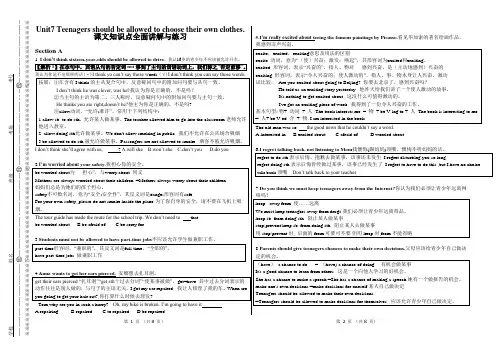
姓名 班级 考场 考号-------------------------○密------------------ -------------------○封----------------------------- -- --○线----------------------------※※※※※※※※※※※※答※※※※※※※※※※※※※※※※※※题※※※※※※※※※※※※※※※※线※※※※※※※※※※※※※5.I ’m really excited about s eeing the famous paintings by Picasso.看见毕加索的著名绘画作品,The old man was so the good news that he couldn’t say a word. A.interested in B.excited about C.afraid of D.worried about7.Do you think we must keep teenagers away from the Internet?你认为我们必须让青少年远离网8.Parents should give teenagers chances to make their own decisions.父母应该给青少年自己做决定的机会。
※※※※※※※※※※※答※※※※※※※※※※※※※※※※※※题※※※※※※※※※※※※※※※※线※※※※※※※※※※※※※※------------------------○密--------------------------------------○封---------------------------------○线------------------------------Section B2.Many teenagers have hobbies. But sometimes these can get in the way of their schoolwork, andparents might worry about their success at school.许多青少年都有爱好。

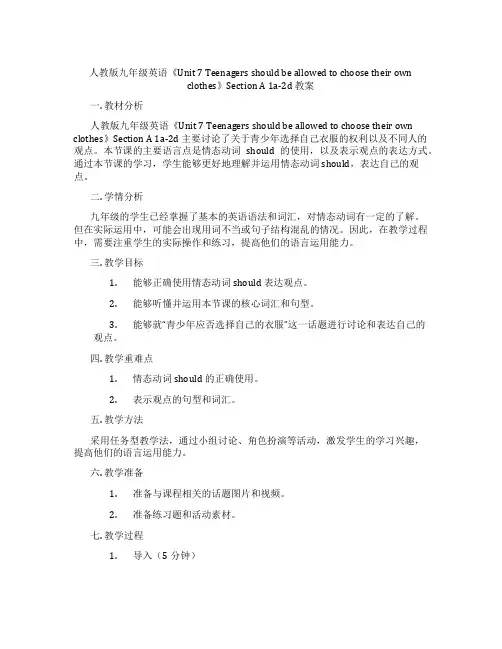
人教版九年级英语《Unit 7 Teenagers should be allowed to choose their ownclothes》Section A 1a-2d 教案一. 教材分析人教版九年级英语《Unit 7 Teenagers should be allowed to choose their own clothes》Section A 1a-2d 主要讨论了关于青少年选择自己衣服的权利以及不同人的观点。
本节课的主要语言点是情态动词should 的使用,以及表示观点的表达方式。
通过本节课的学习,学生能够更好地理解并运用情态动词 should,表达自己的观点。
二. 学情分析九年级的学生已经掌握了基本的英语语法和词汇,对情态动词有一定的了解。
但在实际运用中,可能会出现用词不当或句子结构混乱的情况。
因此,在教学过程中,需要注重学生的实际操作和练习,提高他们的语言运用能力。
三. 教学目标1.能够正确使用情态动词 should 表达观点。
2.能够听懂并运用本节课的核心词汇和句型。
3.能够就“青少年应否选择自己的衣服”这一话题进行讨论和表达自己的观点。
四. 教学重难点1.情态动词 should 的正确使用。
2.表示观点的句型和词汇。
五. 教学方法采用任务型教学法,通过小组讨论、角色扮演等活动,激发学生的学习兴趣,提高他们的语言运用能力。
六. 教学准备1.准备与课程相关的话题图片和视频。
2.准备练习题和活动素材。
七. 教学过程1.导入(5分钟)–利用图片和视频引入话题,引导学生谈论他们自己的衣服和时尚。
2.呈现(10分钟)–展示 1a 图片,让学生猜测对话内容。
–播放 1a 录音,让学生跟读并模仿语音语调。
3.操练(10分钟)–让学生两人一组,模仿 1a 对话,并进行角色互换。
–教师随机抽取学生进行展示,给予评价。
4.巩固(10分钟)–让学生阅读 1b,回答相关问题。
–让学生听 1c 录音,完成练习题。

UNIT 7 Teenagers should be allowed to choose their own clothes. Language Goals:Talk about what you are allowed to do; Agree and disagree谈论你被允许做的事情,同意和不同意Section A1a Read the statements below. Circle A for agree or D for disagree.阅读下面的陈述,同意圈A,不同意圈DCan I go to the shopping center with John?He just got his driver’s license.No way! I don’t think sixteen-year-olds should be allowed to drive.I’m worried about their safety.我能和约翰去购物中心吗?他刚刚拿了他的驾照绝对不行!我认为不应该允许16岁的青少年开车。
我担心你的安全。
1. Teenagers should not be allowed to smoke. A D2. Sixteen-year-olds should be allowed to drive. A D3. Students must not be allowed to have part-time jobs. A D4. Sixteen-year-olds should be allowed to get their ears pierced. A D5. Teenagers should be allowed to choose their own clothes. A D不应该允许青少年抽烟。
应该允许16岁的青少年开车。
不应该允许学生做兼职工作。
应该允许16岁的青少年扎耳洞。
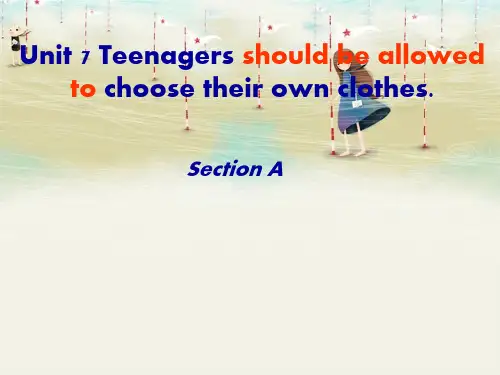
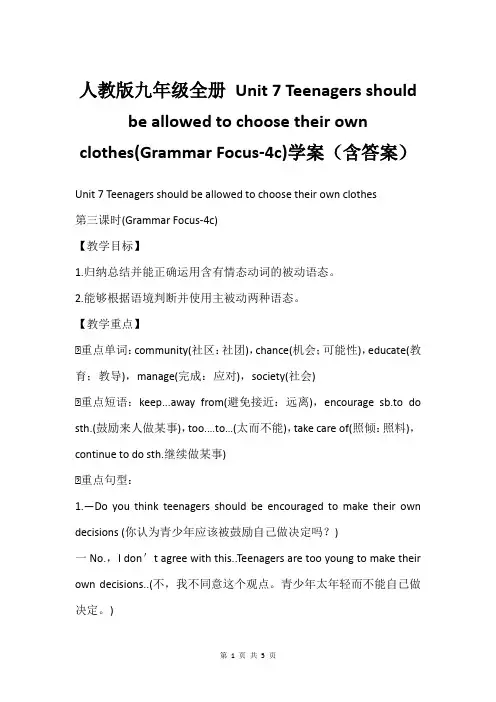
人教版九年级全册Unit 7 Teenagers should be allowed to choose their own clothes(Grammar Focus-4c)学案(含答案)Unit 7 Teenagers should be allowed to choose their own clothes第三课时(Grammar Focus-4c)【教学目标】1.归纳总结并能正确运用含有情态动词的被动语态。
2.能够根据语境判断并使用主被动两种语态。
【教学重点】★重点单词:community(社区:社团),chance(机会;可能性),educate(教育;教导),manage(完成:应对),society(社会)★重点短语:keep...away from(避免接近:远离),encourage sb.to do sth.(鼓励来人做某事),too.…to…(太而不能),take care of(照倾:照料),continue to do sth.继续做某事)★重点句型:1.—Do you think teenagers should be encouraged to make their own decisions (你认为青少年应该被鼓励自己做决定吗?)一No.,I don't agree with this..Teenagers are too young to make their own decisions..(不,我不同意这个观点。
青少年太年轻而不能自已做决定。
)2.一Do you think we may be allowed to take photos if we don't use a flash (你认为如果我们不用闪光灯,可能被允许拍照吗?)一If you don't use a flash.then it may be OK.(如果你们不用闪光灯,可能没问题。
)【课前预习方案】(一)小小翻译官。
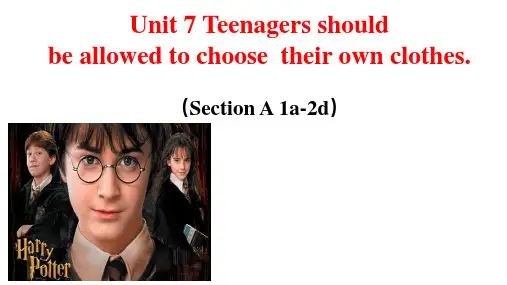
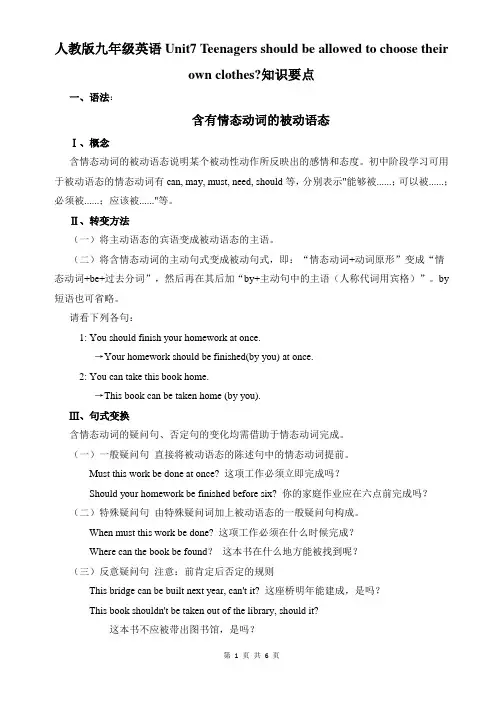
人教版九年级英语Unit7 Teenagers should be allowed to choose theirown clothes?知识要点一、语法:含有情态动词的被动语态Ⅰ、概念含情态动词的被动语态说明某个被动性动作所反映出的感情和态度。
初中阶段学习可用于被动语态的情态动词有can, may, must, need, should等,分别表示"能够被......;可以被......;必须被......;应该被......"等。
Ⅱ、转变方法(一)将主动语态的宾语变成被动语态的主语。
(二)将含情态动词的主动句式变成被动句式,即:“情态动词+动词原形”变成“情态动词+be+过去分词”,然后再在其后加“by+主动句中的主语(人称代词用宾格)”。
by 短语也可省略。
请看下列各句:1: You should finish your homework at once.→Your homework should be finished(by you) at once.2: You can take this book home.→This book can be taken home (by you).Ⅲ、句式变换含情态动词的疑问句、否定句的变化均需借助于情态动词完成。
(一)一般疑问句直接将被动语态的陈述句中的情态动词提前。
Must this work be done at once? 这项工作必须立即完成吗?Should your homework be finished before six? 你的家庭作业应在六点前完成吗?(二)特殊疑问句由特殊疑问词加上被动语态的一般疑问句构成。
When must this work be done? 这项工作必须在什么时候完成?Where can the book be found?这本书在什么地方能被找到呢?(三)反意疑问句注意:前肯定后否定的规则This bridge can be built next year, can't it? 这座桥明年能建成,是吗?This book shouldn't be taken out of the library, should it?这本书不应被带出图书馆,是吗?(四)否定句在情态动词后面加上not或never即可,但must表"必要"时否定式为needn't。
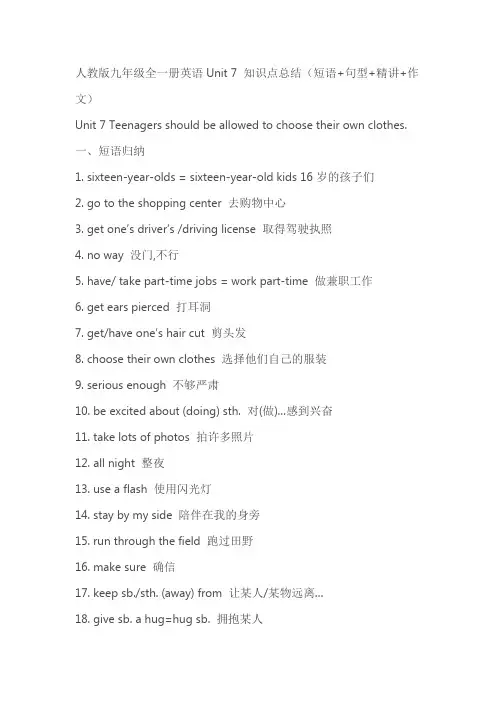
人教版九年级全一册英语Unit 7 知识点总结(短语+句型+精讲+作文)Unit 7 Teenagers should be allowed to choose their own clothes.一、短语归纳1. sixteen-year-olds = sixteen-year-old kids 16岁的孩子们2. go to the shopping center 去购物中心3. get one’s driver’s /driving license 取得驾驶执照4. no way 没门,不行5. have/ take part-time jobs = work part-time 做兼职工作6. get ears pierced 打耳洞7. get/have one’s hair cut 剪头发8. choose their own clothes 选择他们自己的服装9. serious enough 不够严肃10. be excited about (doing) sth. 对(做)…感到兴奋11. take lots of photos 拍许多照片12. all night 整夜13. use a flash 使用闪光灯14. stay by my side 陪伴在我的身旁15. run through the field 跑过田野16. make sure 确信17. keep sb./sth. (away) from 让某人/某物远离…18. give sb. a hug=hug sb. 拥抱某人19. lift up 举起(动副短语) lift it/them up20. talk back to sb. 跟某人顶嘴21. make one’s own decisions =decide for oneself自己做决定22. allow doing sth. 允许做某事23. allow sb. (not) to do sth. 允许某人(不)做某事24. be allowed to do sth. 被允许做某事25. cough badly 咳嗽得厉害26. go out with friends 和朋友外出27. have awful /scary dreams 做噩梦28. think back to those times 回顾过去那些时光29. stay out 待在外面30. move out 搬出去31. regret doing sth. 后悔做了某事(事已做)32. regret to do sth. 遗憾地去做某事(事未做)33. educate sb. to do sth. 教育某人做某事34. agree with sb. 同意某人的观点35. manage one’s own life 应付自己的生活36. in most Asian societies 在大多数亚洲社会37. take the test 参加考试38. pass the test 通过考试39. fail a math test 数学考试不及格40. take the test later补考41. get to class late=be late for late for class 上课迟到42. be strict in sth. 在某方面要求严格43. be strict with sb. 对某人要求严格44. get in the way of… 挡…的路,妨碍…45. suppor t one’s dream 支持某人的梦想46. teenagers under eighteen 18岁以下的青少年47. have nothing against (doing) sth. 不反对(做)某事48. be serious about…= take…seriously 对…认真,热衷于…49. spend more time on his homework在他的家庭作业上多花点时间50. care about sb. 关心/担心某人51. a professional runner 一名职业赛跑运动员52. end up as 最终成为…53. how much 多么(提问程度)54. enter university 进入大学55. make a choice (oneself) (自己)做选择56. have no choice but to do sth.除了做某事以外,别无选择57. hurt oneself 伤到自己58. have a chance to do sth. 有机会做某事59. reply to sb.= answer sb. 回答/答复某人二、词汇精讲1.choosechoose作动词,意为“选择,挑选”,后接宾语,常用搭配如下:choose sth. for sb. 为某人选择某物;choose sb. to do sth. 选择某人做某事;choose + wh从句(where,what,when等引导的特殊疑问句)例如:We has chosen a birthday present for you. 我们已经为你选择了一个礼物。
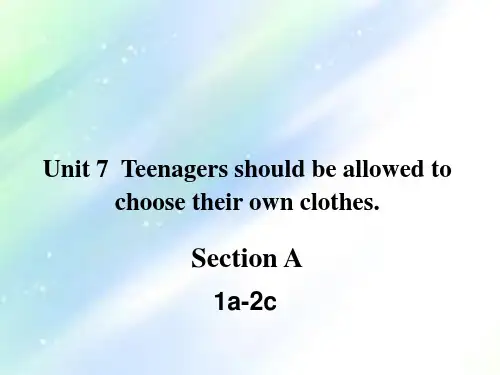
Unit 7 Teenagers should be allowed to choose their own clothes(第1课时)一、教材分析:本节课着重谈论青少年是否被允许做某事及对该事物的评价。
即围绕“Teenagers should(not) be allowed to ------.”这个话题进行讨论的。
其难点是被动语态的运用。
提倡课前预习是我们的一贯做法。
本课把直观式教学注入到任务型教学之中,让学生真正体验到“学中有乐,乐在学中”。
二、三维目标:1.知识和技能目标:1)谈论青少年应该或不应该被允许做什么。
Teenagers should(not) be allowed to ------.2) 了解家规、班规、校规。
2.过程与方法目标:1)能运用所学知识练习被动语态的句式。
2)能用所学句型进行交际练习。
3)提倡课前预习是我们的一贯做法。
本课把直观式教学注入到任务型教学之中,让学生真正体验到“学中有乐,乐在学中”。
3.情感、态度和价值观目标:培养学生的听说演等能力及合作学习的意识。
三、教学重点:围绕“Sb should(not) be allowed to do sth”这个话题,运用所学短语进行讨论。
四、教学难点:被动语态的运用及构成。
五、教学策略:通过谈论家规、班规和校规,充分掌握被动语态的用法.六、教学准备: 多媒体课件教科书卡片录音机课前预习学案。
七、教学环节:Step1 Phrases learningShow these cards in Chinese:go out with friends every night get their ears pierced have part-time jobs drive choose their own clothes work at night do homework with friendsRead after the teacher the phrases .Then read together.Ask the students read the cards one by one.(出示卡片,学习短语; 运用卡片检验学习效果。
郑州市九年级英语全册Unit7Teenagersshouldbeallowedtochoosetheirownclothes重点知识归纳单选题1、As middle school students, we follow the public rules wherever we go. A.wouldB.shouldC.mightD.could答案:B句意:作为中学生,无论去哪里,我们都应该遵守公共规则。
A. would将会;B. should应该;C. might可能;D. could可以。
should 作为情态动词,通常用来表示现在或将来的责任或义务,译作“应该”、“应当”。
故答案为B。
2、—Shall we go birdwatching tomorrow?— ________! I’d love to.A.Good luckB.Best wishesC.Sounds greatD.You’re welcome答案:C句意:——我们明天去赏鸟好吗?——听起来不错!我想去。
考查情景交际。
Good luck祝你好运;Best wishes最美好的祝愿;Sounds great听起来不错;You’re welcome不客气。
根据“Shall we go birdwatching tomorrow”及“I’d love to”可知,认为对方的建议不错,故选C。
3、The moonlight goes ____ the window and makes the room bright.A.acrossB.throughC.overD.in答案:B试题分析:句意:月光从窗户透进来,把整个屋子照亮了。
A介词,横过,穿过。
常指从这边到另一边。
即:“from the side to the other”,图形好像“十”字一样。
B 介词。
着重指从空间的一头传到另一头,也就是说从一个物体的空间里穿过。
C从物体表面上方经过,不与物体接触。
Unit 7 Teenagers should be allowed to choose their own clothes单元总览类别课程标准要求掌握的项目单元话题In this unit, students learn to talk about rules重点单词1.safety n.安全;2.smoke v. 吸烟;n. 烟;3.earring n. 耳环;耳朵4.flash n.闪光灯; v.闪耀5. tiny adj. 极小的;微小的;6. lift v. 举起,n. 电梯;7. awful adj. 很坏的,讨厌的;8.regret v&n感到遗憾,懊悔;9. community n. 社区,社团;10. chance n.机会,可能性;11. educate v. 教育,12. manage v.完成,应付13. society n. 社会;14. support v&n.支持;15. enter v.进来;进去;16. choice n.选择,挑选;重点词组1. the driver’s license 驾照2. No way 休想3. have part-time jobs. 有兼职工作4. get their ears pierced 穿耳洞5. stay by my side陪伴在我身旁6. lift…up 把…举起来7. talk back 顶嘴8. think back to…回想起…9. make on e’s own decision自己做决定10. keep…away from 避免接近,远离11. manage their own lives 应对自己的生活12. take the test later补考13. be strict with对…严格要求14. get in the way of挡…的路,妨碍15. have nothing against running没理由反对赛跑16. enter university 进入大学17. be serious about (doing) sth对…认真18. make a choice做出一个选择19. keep off the mobile phones屏蔽手机20. be put first放在首位重点句式1. ---我认为16岁的青少年不应被允许开车。
---我同意。
他们不够严肃认真。
---I don’t think sixteen-year-olds should be allowed to drive.---I agree, they aren’t serious enough.2. 青少年不应被允许吸烟。
Teenagers should not be allowed to smoke.3. 学生们不应当被允许有兼职工作。
Students should not be allowed to have part-time jobs.4. 青少年应当被允许选择自己的衣服。
Teenagers should be allowed to choose their own clothes.5. 我不应当被告诉要做什么。
I should not be told what to do.6. ---你认为青少年应该被鼓励自己做决定吗?---不,我不同意。
青少年太小不能自己做决定---Do you think teenagers should be encouraged to make their own decisions?---No, I don’t agree with this. Teenagers are too young to make their own decisions.单元语法should +be allowed to课时分解第一课时Section A(1a ~ 2d)I. I. 知识目标类别课时要点重点单词1.safety n.安全;2.smoke v. 吸烟;3.earring n. 耳环;耳朵:4.flash n.闪光灯;重点词组1. the driver’s license 驾照2. No way 休想3. have part-time jobs. 有兼职工作4. get their ears pierced 穿耳洞5. cut the hair 理发6. the famous painting by Picasso毕加索的名画7. use a flash 使用闪光灯重点句式1. ---I don’t think sixteen-year-olds should beallowed to drive.---I agree, they aren’t serious enough.---我认为16岁的青少年不应被允许开车。
---我同意。
他们不够严肃认真。
2. Teenagers should not be allowed to smoke.青少年不应被允许吸烟。
3. Students should not be allowed to havepart-time jobs.学生们不应当被允许有兼职工作。
4. Teenagers should be allowed to choosetheir own clothes.青少年应当被允许选择自己的衣服。
5. Do you think we may be allowed to takephotos if we don’t use a flash?你认为如果我们不用闪光灯,我们可能被允许拍照吗?II. 课堂环节§自主学习方案【自学自查】根据汉语提示完成单词。
1. The policeman asked the driver to show his driver’s license (执照).2. My mother doesn’t like the girl who wears the earrings (耳环).3. Most of the parents are worrying about their children’s safety (安全)。
4. My father coughed badly, the doctor asked him to give up smoking (吸烟),5. Nowadays teenagers (青少年) have many different thoughts.§课堂导学方案Step 1 情景导入每个青少年在生活中都会碰到允许或者不允许做某事,例如在商场购物时,我们应该允许选择自己的衣服,而作为父母却不允许我们选择自己的衣服,你们有这样的经历吗?你们是赞同还是不赞同呢,请大家说出自己的观点。
Teacher: Could you tell me what students should be allowed to do or shouldn’t be allowed to do?Students:①Students should be allowed have part-time jobs.②Students shouldn’t be allowed get their ears pierced.…环节说明:通过课前师生互动,让学生在自己感兴趣的话题产生共鸣,能调动学生学习的积极性,同时beallowed to do的应用,为学习新课打下了伏笔。
Step 2 完成教材1a-1c的任务【操作案例】1. 要求学生翻开课本P49,迅速阅读1a部分的内容。
然后自己判断赞同还是不赞同1a的内容。
(1分钟)2. 检查答案,先要求全班一起给出答案并检查讨论。
然后要求小组就should be allowed to do sth.的用法进行讨论,并通过以下问题对青少年应该做什么或者不允许做什么进行反馈,与学生互动。
(3分钟)参考案例Teacher: I don’t think students should be allowed to go toNet Bar.Students: I agree.3. 要求学生听第一遍录音,并完成课本上1b的听力任务。
(1分钟)1.T 2.F 3.T4. 要求学生听第二遍录音,并逐句进行跟读。
(2分钟)5. 完成教材1c的任务,要求学生根据1a中的陈述,利用方框内的短语编写对话,进行练习,然后要求2-3位学生上台表演。
(3分钟)6. 听力内容巩固训练。
要求学生根据所听到的内容完成下列问题。
完成后要求若干学生给出自己的答案。
以巩固对听力内容的了解。
(4分钟)1)根据所听内容回答问题。
What is the relationship of two speakers?Mother and daughter.2)再听,完成填空。
The woman doesn’t think sixteen-year-olds should beallowed to drive because they aren’t serious enough. Annathinks teenagers should be allowed to choose their ownclothes because she is not a child.环节说明:将听、说、读、写的任务结合起来不仅锻炼了学生的语言综合运用能力,还巩固了学生对目标语言的学习、识记和运用。
Step 3 完成教材2a-2c的任务【操作案例】1. 要求学生翻开课本P50。
播放录音一遍,完成2a,2b的听力任务。
(1分钟)2. 要求学生听第二遍录音,并逐句进行跟读。
(2分钟)3. 完成教材2c的任务,要求学生模仿听力内容,使用“should be allowed to”进行对话练习。
并邀请2-3对同学当堂进行演示。
(3分钟)4. 小结训练。
要求学生在规定的时间内完成一个小练习。
并请若干学生给出自己的答案。
有错误的话及时解决纠正。
(2分钟)汉译英,每空一词1.青少年应该允许选择他们自己的衣服。
Teenagers should be allowed to choose their ownclothes.2.16岁的青少年不应该允许驾车。
Sixteen- year- olds should not be allowed to drive.3.老师来的时候,你们应该停止说话。
You should stop talking when the teacher comes in.4.他想花费些时间与妈妈在一起He wants to spend some time with his mother.6. 播放2d的对话录音,让学生跟读,模仿并理解大意。